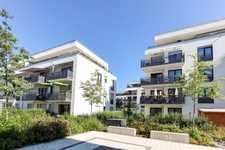A down payment is seen by banks as a sign of seriousness and financial strength when buying a property. However, investing too much of your savings into a purchase can be counterproductive, and even risky in the long term. Should you really put all your money into buying your house or apartment? In this article, Optimhome helps you find the right balance.
Down Payment for a Mortgage in France : Definition and Key Facts to Know
When it comes to buying property, the question of the down payment inevitably comes up. Increasingly required by lenders, it is a major lever for obtaining a mortgage, as well as for negotiating better borrowing conditions. Yet many buyers don’t fully understand its scope.
This first section clarifies what a down payment is in a real estate purchase, its role in a mortgage application, and what can make it up. It gives future buyers a solid foundation before even considering the ideal amount to put into their project.
What Is a Down Payment in a Mortgage?
The down payment is the sum a buyer has available to finance part of their property purchase without taking out a bank loan. This usually comes from savings, but other sources may be included: inheritance, gifts, a family loan, or the sale of another property.
The down payment is primarily used to cover ancillary purchase costs: notary fees, guarantee fees, application fees, or agency fees. It therefore reduces the need for credit for expenses that banks do not always finance.
In 2025, it is becoming increasingly rare to obtain a mortgage without a down payment, except for very strong profiles or specific projects — such as new-build purchases with a zero-interest loan (PTZ), or young first-time buyers.
What Role Does the Down Payment Play in a Mortgage Application?
For the bank, the down payment is a sign of seriousness and solvency. It demonstrates the borrower’s ability to save and manage their finances, reassuring the lender of their capacity to repay the mortgage over time.
It also helps reduce the amount borrowed, which has an immediate effect on the debt ratio and the total cost of the loan. In a context where interest rates are relatively high, this can mean savings of several thousand euros over the life of the loan.
Another advantage: a significant down payment can speed up approval and open the door to better terms (lower rate, reduced fees, shorter term). However, it must be used strategically to avoid weakening your overall financial situation.
Also read on the Optimhome blog: News – 5 Tips for Negotiating Your Mortgage
How Much of a Down Payment Do You Need for a Property Purchase in France in 2025?
In 2025, deciding how much to put down is more strategic than ever. With more volatile interest rates, banks now require higher down payments than in previous years, while still paying close attention to the borrower’s overall financial capacity.
This section helps you understand the minimum down payment expected, how it is calculated, and how to adapt it to your profile, your project (new-build or resale, primary residence or rental investment), and your personal situation (age, income, marital status, etc.).
What Is the Minimum Down Payment Required by Banks?
As a general rule, banks require at least 10% of the purchase price as a down payment, in order to cover notary and guarantee fees. This means that for a property worth €250,000, you need at least €25,000 in cash.
However, this minimum can be increased in certain cases. For profiles considered riskier (fixed-term contracts, self-employed workers, first-time buyers without a strong banking history), some banks require 15–20% to secure financing.
In 2025, the average down payment for a property purchase even exceeds 30% in some regions, particularly for wealthy households or investors. But beware: putting down too much can limit your borrowing capacity or harm your liquidity.
Should You Adjust Your Down Payment Based on the Type of Property or Project?
Yes — the ideal down payment amount depends greatly on the nature of the real estate project:
For an apartment as a primary residence: 10–15% is often enough.
For a house, especially with renovation work: banks may require up to 20% or more.
For a rental investment: some lenders accept no down payment at all, provided the rental yield comfortably covers the monthly repayment.
Another factor: if you are a first-time buyer or young buyer, certain assistance programs can compensate for a low down payment (zero-interest loans, subsidized loans). However, in return, credit approval conditions will be stricter.
Finally, in cases such as buying as a couple with unequal down payments, it is advisable to clearly outline the contribution split in the purchase agreement and consider setting up a co-ownership agreement or an adapted PACS contract.
Also read on the Optimhome blog: News – How to Build Real Estate Wealth?
Why a Too-High Down Payment Is Not Recommended for a Property Purchase
While a down payment is often seen as a key element in the success of a real estate project, this does not mean that a large down payment is always the best strategy. In reality, putting all your available funds into the purchase can be counterproductive — and even risky — depending on your situation and your medium- to long-term goals.
In this section, we explain why it can sometimes be better to limit your down payment, in order to maintain financial flexibility, optimize your borrowing capacity, and even benefit from better mortgage conditions from banks.
Keeping an Emergency Fund: A Commonly Underestimated Precaution
Putting the majority of your savings into your down payment can weaken your financial situation both in the short and long term. In the event of an unexpected expense (job loss, urgent repairs, need for cash for a new project), not having available funds can put you in difficulty — or even lead to missed payments.
Moreover, banks often value borrowers who keep residual savings when granting a mortgage, as it demonstrates healthy financial management and reduces risk. It’s not just about providing a minimum down payment, but also about showing your ability to anticipate.
It’s also a matter of strategy: it’s sometimes wiser to keep part of your funds in savings or financial investments (life insurance, home savings plans, savings accounts, etc.) rather than locking it all into your main residence.
A Too-High Down Payment Can Reduce Your Borrowing Capacity
In some cases, a down payment greater than 30% of the purchase price can limit your overall borrowing capacity. While it reduces your monthly payment, it may also limit your ability to finance other projects through loans — such as a rental investment or renovation work.
Additionally, banks sometimes adjust their mortgage offers based on the size of the down payment: a very high down payment can lead them to offer a less competitive interest rate or to limit negotiable benefits (application fees, borrower insurance, flexibility options, etc.).
Finally, if you qualify for a Zero-Interest Loan (PTZ), employer-assisted loans, or local government grants, injecting too much personal capital could cause you to lose access to these very advantageous alternatives.
The Advantages of a Down Payment in a Property Purchase
While an overly large down payment can sometimes throw off your investment strategy, having no down payment at all also comes with major drawbacks. In most cases, having a down payment remains essential for successfully completing a real estate purchase, securing a mortgage on favorable terms, and reassuring banks.
Securing Better Loan Conditions from Banks
To banks, a down payment is far more than just a sum of money. It’s proof of commitment, savings capacity, and financial reliability. By contributing part of the total purchase price, you strengthen the credibility of your mortgage application.
This often translates into a more competitive interest rate, lower borrower insurance costs, and even reduced application fees. A down payment also reduces the risk of over-indebtedness, potentially increasing your borrowing capacity for other projects (second home, rental investment, etc.).
Another key point: some banks that grant mortgages without a down payment may require heavier guarantees or additional conditions, increasing the total cost of financing. With a down payment, these requirements are often lighter.
Covering Ancillary Costs and Streamlining the Purchase Process
A down payment is often used to cover notary fees, guarantee fees, application fees, or even furniture and renovation costs. These expenses are generally not included in the mortgage — except in specific cases such as home improvement loans.
By anticipating these costs, you reduce the risk of delays when signing the deed of sale, especially if the notary requires the down payment to finalize the transaction.
In addition, providing proof of your down payment during mortgage discussions strengthens the credibility of your project. It can even speed up the release of funds and simplify the loan setup process.
Finally, in certain cases (such as purchases under the Pinel or Denormandie tax schemes, or for a primary residence), the down payment can help structure financing in a way that maximizes tax benefits or meets income ceilings.
Also read on the Optimhome blog: News – What Financial Assistance Is Available for First-Time Buyers in 2025?
How to Buy a Property Without a Down Payment in France
While a down payment is recommended in many cases, it is possible to purchase a property without one — especially for first-time buyers, young professionals, or households with stable incomes but no significant savings.
Some banks may be hesitant, but certain profiles can secure a 110% mortgage, which covers both the purchase price and notary fees.
Who Can Buy Without a Down Payment?
Some buyer profiles can more easily obtain a mortgage without a down payment, particularly:
First-time buyers purchasing their primary residence,
Young employees on permanent contracts with stable incomes,
Borrowers benefiting from public programs (such as the Zero-Interest Loan – PTZ),
Households supported by local authorities offering homeownership assistance,
Buyers expecting an inheritance or delayed family support, even if the funds are not available at the time of the loan offer.
In such cases, the absence of a down payment is not a deal-breaker as long as the bank considers the disposable income, debt-to-income ratio, and repayment capacity satisfactory.
It is essential to present a strong application with pay slips, proof of regular income, a stable professional situation, and little to no existing debt. A good banking history (no overdrafts, even modest savings, etc.) will also strengthen the credibility of the project.
Strategies to Convince a Bank Without a Down Payment
The main challenge when buying without a down payment is to reassure the bank about your ability to handle a long-term loan. This can be achieved through several approaches:
Prepare a strong financing file: Gather all necessary documents (ID, proof of address, income, employment, expenses, etc.), and present a clear budget including notary fees, borrower insurance, and any renovation costs.
Run financing simulations with and without a down payment, highlighting the favorable loan terms you could obtain. Some online platforms offer property purchase simulators that can support your case.
Highlight your borrower profile: job stability, lifestyle, sound budget management, and career growth potential — all of which can offset the lack of a down payment.
Apply for a PTZ or other public assistance, which can replace part of the down payment and be considered as an entry contribution to the mortgage. The PTZ amount varies depending on location, property type, and household composition.
Consult specialized lenders or cooperative banks, which are often more open to financing purchases without a down payment. Working with a mortgage broker or independent advisor can help you access these offers.
Also read on the Optimhome blog: News – Can You Get a Mortgage Without a Down Payment in 2025?
Why a Too-High Down Payment Is Not Recommended for a Property Purchase in France ?
At first glance, making a large down payment on a property might seem like an excellent strategy. It reduces the amount borrowed — and therefore the interest — and reassures the bank. However, putting down too much money is not always wise, especially if it leaves you without available cash, financial investment opportunities, or limits your ability to invest elsewhere.
In this section, we’ll explain why it can sometimes be smarter to keep part of your savings and how to strike the right balance between financial security and profitability.
The Limits of a Large Down Payment
A large down payment may seem reassuring, but it also comes with lesser-known drawbacks:
Loss of financial flexibility: By using up most of your savings, you reduce your ability to deal with unexpected events (unplanned repairs, changes in employment, urgent expenses, etc.).
Reduced investment leverage: A mortgage is a financial leverage tool. By borrowing at a low interest rate, you can keep your cash aside to diversify your investments (stocks, rental property, life insurance, etc.). Putting all your funds into a single project reduces your long-term overall return potential.
Impact on tax benefits: For rental investments (such as under the Pinel or Denormandie schemes), mortgage interest is deductible from rental income. The more you borrow, the greater the tax deduction. A high down payment reduces this benefit.
In some cases, it’s wiser to limit the down payment to take advantage of the leverage effect of borrowing, optimize tax benefits, and preserve an emergency fund.
How to Optimize Your Down Payment Without Hurting Your Finances
Rather than maximizing your down payment, the ideal approach is to aim for a balance suited to your personal and financial situation. Here are some tips to help you adjust your down payment amount:
Meet a minimum contribution: Generally, it’s recommended to cover at least the notary fees (around 7–8% of the purchase price for older properties), which reassures banks without exhausting your savings. This is often enough to secure favorable loan conditions.
Keep an emergency fund: Even if you have a large amount of cash, keep some available in a savings account, home savings plan, or liquid life insurance policy. This ensures you can react quickly when needed.
Run multiple simulations: Before making any decision, use a mortgage calculator with different down payment levels (10%, 20%, 30%, etc.) to study the impact on the total loan cost, monthly payments, and future borrowing capacity.
Adapt to your project: The right down payment amount depends on the type of purchase (primary residence, rental investment, buy-to-sell, holiday home), your age, your income, and your long-term goals.
Remember, every property purchase is unique. It’s often best to seek guidance from a financial advisor or mortgage professional to tailor your down payment strategy to your profile.
Conclusion: Key Takeaways on Down Payments and Property Purchases in France
A down payment is often essential for obtaining a mortgage on good terms, particularly to cover notary fees and reassure banks.
It’s not always wise to invest all your savings — too high a down payment can limit your borrowing capacity, flexibility, and future investment opportunities.
The ideal amount depends on many factors:
Your project (primary residence or rental investment),
Your borrower profile,
Your financial goals,
Your available savings.
Banks generally prefer a down payment of 10–20%, but there are ways to borrow without one, especially for first-time buyers or under PTZ schemes.
Before committing, compare scenarios, run simulations, and seek advice from a real estate agent or mortgage broker to secure your purchase.
For a successful and worry-free property project, contact your local Optimhome real estate advisor and regularly check our many property listings across France to find your dream home!
FAQ: Common Questions About Down Payments for a Property Purchase
How much down payment is needed for a property purchase in France?
In general, a down payment of 10–20% of the property price is recommended to cover notary fees and reassure banks.
How much down payment is needed to buy a house in France?
For a house, the recommended down payment is often between 10% and 30%, depending on the purchase price, your profile, and the type of financing you want.
How much down payment is needed to buy an apartment?
A down payment of around 10–15% is usually enough for an apartment, but some lenders may require more depending on the location and market.
Can you buy a property without a down payment?
Yes, it is possible, especially if you are a first-time buyer or qualify for an assisted loan such as the PTZ — though it’s less common.
Which banks offer mortgages without a down payment?
Some banks do, but they will closely assess your income stability and debt-to-income ratio.
How much down payment is needed for a standard mortgage?
For a typical mortgage, 10% is generally required to cover ancillary costs — more in certain borrower profiles.
How can you build up a down payment for a property purchase?
A down payment can come from savings, a life insurance withdrawal, a home savings plan, an inheritance, a family gift, or employer contributions (such as PEI/PERCO).
When is the down payment paid in a property purchase?
It is paid at the time of signing the final deed of sale, usually by bank transfer to the notary before the signing.
Should you put all your savings into a property purchase?
No — it’s best to keep an emergency fund for unforeseen expenses, renovations, or other personal projects.
What percentage of down payment is recommended for a property purchase?
A percentage of 10–20% is often advised. Beyond that, it could limit your ability to finance other projects or investments.
Author :

Fabrice DOBROWOLSKI - Optimhome Network Development Director
Optimhome offers you personalized support for your real estate project. Benefit from all my advice, based on several years of experience, to ensure the success of your project.











